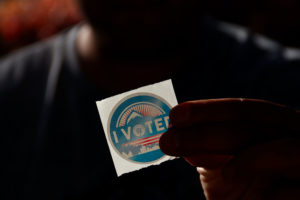Atheist and Freethinker Candidates Make Electoral Gains
 Photo by Manny Becerra on Unsplash
Photo by Manny Becerra on Unsplash Humanists across the nation and around the world are joining in the celebration of Donald Trump’s defeat. We can now embrace hope for progress in a way that wasn’t possible these last four years. While we don’t wish to sink to his level of strident demonization, we do need to recognize that seventy million people voted for the most regressive president our country has seen in over a century. So even while we rejoice, we know our struggle for a more reasonable, egalitarian, compassionate America, has a long way to go.
Polling prior to the 2020 general election generated hope for a clear repudiation of Trump and his Christian nationalist base of support. Sadly, this election demonstrates that a substantial number of Americans continue to embrace the dangerous political agenda of white Christian nationalists. A Biden presidency will offer some protection against the worst aspects of their agenda; however, the results of this election demonstrate that the Christian nationalist’s bigoted, anti-science, racist, misogynistic, xenophobic, and homophobic crusade will continue.
Fortunately, the growth of the atheist and humanist community and our increasing political engagement has the potential to serve as an effective counter to Christian nationalism. Our participation was not enough to make gains in the U.S. Congress and state legislatures this election, but our continued growth and engagement make us a constituency to be reckoned with. The atheist, agnostic, and religiously unaffiliated voting bloc has nearly doubled since 2008—from fifteen percent to twenty-eight percent of registered voters. Our community needs to continue to organize and make our values known at the ballot box and members of our community need to run for public office.
Prior to the 2016 general election there were only five elected officials serving in state legislatures who publicly identified with the atheist and humanist community. After the 2016 election that list grew to seventeen, and after the 2018 election to forty seven. Once the newly elected officials are sworn into office in 2021, there will be sixty-three nontheist elected officials at the federal and state level.
These electoral gains have been facilitated by the Freethought Equality Fund, a political action committee affiliated with the Center for Freethought Equality, which is the political and advocacy arm of the American Humanist Association. For 2020, these gains include atheist, humanist, and agnostic candidates like Melissa Sargent and Kelda Roys who won seats in the Wisconsin State Senate, Julie Mayfield who won a seat in the North Carolina State Senate, Melody Hernandez who will join Juan Mendez and Athena Salman in the Arizona legislature, Judy Amabile who won a seat in the Colorado State House, and fourteen New Hampshire House of Representative members who will serve in the 2021 Session – including Tim Smith who, in his fifth term, will be the longest serving public atheist elected official in America. In a very close contest, first-term Texas state legislator Jon Rosenthal, the only Texas elected official who publicly identifies with our community, won re-election by just 317 votes. A clear example that every vote counts.
The Freethought Equality Fund’s 2020 endorsements and their election results can be found here. We are very proud of the openly humanist, atheist, agnostic, and nonreligious candidates who ran for office this year and the growing engagement of our community in the political process.
A list of nontheist local, state, and federal elected officials can be found here. This list includes Congressman Jared Huffman (CA-2) who announced in November 2017 that he is a humanist and agnostic. In April 2018, along with Jamie Raskin (MD-8), Huffman founded and co-chairs the Congressional Freethought Caucus, which is an advocacy group for church-state separation and evidence-based public policy. Every member of the Congressional Freethought Caucus also won re-election.
The continued growth of the atheist and humanist community, and our increased engagement in the political process, provides hope that the outcome of future elections will create a safer, saner, stronger America. You can help make this future possible by joining the Center for Freethought Equality (membership is free!).
As a member you will learn about activities of the Center for Freethought Equality and the Freethought Equality Fund PAC. For example, members can attend a virtual meeting on December 8 at 7pm ET with Rep. Jared Huffman (CA-2) and North Carolina State Senator-elect Julie Mayfield to discuss the election results along with plans for the presidential transition and legislative initiatives. Become a member and learn more.
And don’t forget to attend the American Humanist Association’s November 19 “Speaking of Humanism” event to hear Karl Frisch, a school board member in Fairfax County and the only elected official in Virginia who publicly identifies with our community, talk about running for local office in an area targeted by religious extremists.
